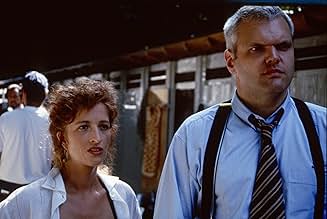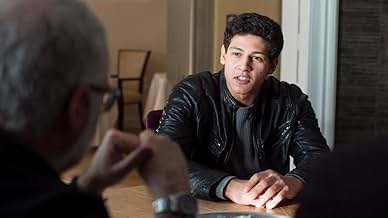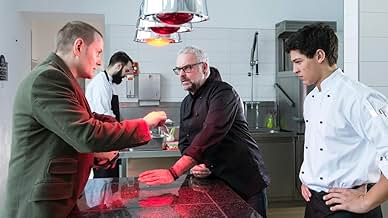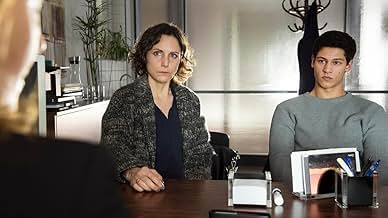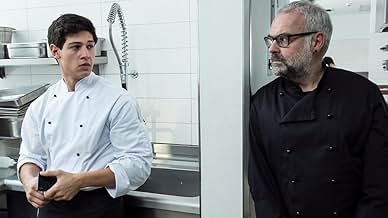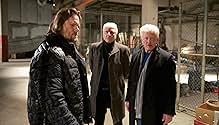Una raccolta di storie di una squadra d'investigatori che lavorano insieme per risolvere un crimine.Una raccolta di storie di una squadra d'investigatori che lavorano insieme per risolvere un crimine.Una raccolta di storie di una squadra d'investigatori che lavorano insieme per risolvere un crimine.
- Premi
- 127 vittorie e 180 candidature totali
Sfoglia gli episodi
Recensioni in evidenza
"Tatort" (= Crime Scene) is one of the most popular detective series on German TV. Feature length (90 min) episodes air on roughly 30 Sundays of the year - following the evening news at 8:15 p.m.
The public network ARD that shows "Tatort" is organized federally, i.e. it consists of a dozen regional TV stations. Each regional station have their own police team depicted in their region. So, there is a Berlin team, a Hamburg team, and so on - each have their own episodes under the common label. Larger regional stations like WDR (Cologne) add 3 or 4 episodes each year, smaller ones like tiny Radio Bremen just 1.
The style and setting vary with the teams - that is part of the fun of the series. Episodes from Frankfurt have been rather vanguard in terms of cinematography and storytelling, while the Münster team is famed for their witty dialogues and comic effects.
The regional differences also lead to a competition for audiences and public attention. Viewers tend to choose what team episodes to watch - with consequences for audience ratings and public discussions about the poor scripts or the cheap productions that the Tatorte from some stations have been suffering recently.
The feature length and the producers' ambitions to show not only entertaining crime stories but also to present social issues like child abuse, integration of immigrants, or school violence lead to high public awareness for "Tatort". Episodes are regularly reviewed in quality newspapers like Frankfurter Allgemeine or Süddeutsche Zeitung.
The public network ARD that shows "Tatort" is organized federally, i.e. it consists of a dozen regional TV stations. Each regional station have their own police team depicted in their region. So, there is a Berlin team, a Hamburg team, and so on - each have their own episodes under the common label. Larger regional stations like WDR (Cologne) add 3 or 4 episodes each year, smaller ones like tiny Radio Bremen just 1.
The style and setting vary with the teams - that is part of the fun of the series. Episodes from Frankfurt have been rather vanguard in terms of cinematography and storytelling, while the Münster team is famed for their witty dialogues and comic effects.
The regional differences also lead to a competition for audiences and public attention. Viewers tend to choose what team episodes to watch - with consequences for audience ratings and public discussions about the poor scripts or the cheap productions that the Tatorte from some stations have been suffering recently.
The feature length and the producers' ambitions to show not only entertaining crime stories but also to present social issues like child abuse, integration of immigrants, or school violence lead to high public awareness for "Tatort". Episodes are regularly reviewed in quality newspapers like Frankfurter Allgemeine or Süddeutsche Zeitung.
Currently there are three seasons running on MHz identified as Tatort: Cologne (crime scene, Cologne) going from 1998 to 2007 that feature Inspectors Max Ballauf and Freddy Schenk (actors Klaus Behrendt and Dietmar Bar). The two actors work well together and it's interesting to see them adapt to new technology and changes in police procedure. Those changes aren't part of the stories but just note how quickly things change.
At times Max and Freddie's personal issues can surface in an episode to add to building of their characters, and at times as crucial story points. Max has even been known to sleep with a suspect. Several episodes deal with social problems and the stories can be very gritty and the conclusions quite depressing.
At times both my wife and I yell at the screen when obviously bad conclusions are reached by the inspectors but you do have to fill about 90 minutes per episode. At times the episodes seem more about commenting on social issues rather than being solid mystery stories. In spite of some of these commentaries, the two forge ahead but they seem to get to finding the perp more by dumb luck than solid detective work. But they do doggedly pursue their quarry and usually catch the suspect.
Like any series, there are good episodes and disappointing ones but Max and Freddy are worth a look.
At times Max and Freddie's personal issues can surface in an episode to add to building of their characters, and at times as crucial story points. Max has even been known to sleep with a suspect. Several episodes deal with social problems and the stories can be very gritty and the conclusions quite depressing.
At times both my wife and I yell at the screen when obviously bad conclusions are reached by the inspectors but you do have to fill about 90 minutes per episode. At times the episodes seem more about commenting on social issues rather than being solid mystery stories. In spite of some of these commentaries, the two forge ahead but they seem to get to finding the perp more by dumb luck than solid detective work. But they do doggedly pursue their quarry and usually catch the suspect.
Like any series, there are good episodes and disappointing ones but Max and Freddy are worth a look.
How do you review a series of over 1100 episodes? I have to start by admitting I've only seen thirteen "Lindholm" programmes and two "Cologne" ones.
The first thing that struck me was the cheesy seventies theme music and the dreadful title sequences. I'd honestly thought that I'd downloaded something from fifty years ago. However, it turned out that the Lindholm episodes were set in a recent past where primitive mobile phones were used in the earlier episodes and smartphones towards the later ones. I learnt that the theme and titles had remained the same for fifty years and the programme makers keep them as a tradition.
Despite the Lindholm episodes having the same star, Maria Furtwangler, it's clear that the different programmes were written and directed by a myriad of varied people. The styles were completely different as was the dialogue and plot development. One thing that was consistent and was, I assume, a basic template was that Frau Hauptkommissarin Lindholm was always close to the edge both in her personal life and her investigations. She broke rules with impunity and, in reality, wouldn't have lasted five minutes in any LKA or even local police station.
A few of the cases were solved by coincidences even when she knew who the perp was but she sometimes wasn't allowed to arrest as she didn't have the evidence. However, a chance meeting or finding led her to get her man. It was also slightly annoying that car accidents played such a large part in some of the plots.
Her personal life was a shambles and men came and went with no seeming reason. Mum was on hand to look after her child who simply didn't figure in the final episode.
I can't say much about the couple of Cologne ones I've seen as it was a long time ago, but they seemed to be darker.
All told, the stories were not boring and held the attention for the ninety minutes of each episode. They aren't the most scintillating television I've seen, but worth a look on a rainy afternoon.
The first thing that struck me was the cheesy seventies theme music and the dreadful title sequences. I'd honestly thought that I'd downloaded something from fifty years ago. However, it turned out that the Lindholm episodes were set in a recent past where primitive mobile phones were used in the earlier episodes and smartphones towards the later ones. I learnt that the theme and titles had remained the same for fifty years and the programme makers keep them as a tradition.
Despite the Lindholm episodes having the same star, Maria Furtwangler, it's clear that the different programmes were written and directed by a myriad of varied people. The styles were completely different as was the dialogue and plot development. One thing that was consistent and was, I assume, a basic template was that Frau Hauptkommissarin Lindholm was always close to the edge both in her personal life and her investigations. She broke rules with impunity and, in reality, wouldn't have lasted five minutes in any LKA or even local police station.
A few of the cases were solved by coincidences even when she knew who the perp was but she sometimes wasn't allowed to arrest as she didn't have the evidence. However, a chance meeting or finding led her to get her man. It was also slightly annoying that car accidents played such a large part in some of the plots.
Her personal life was a shambles and men came and went with no seeming reason. Mum was on hand to look after her child who simply didn't figure in the final episode.
I can't say much about the couple of Cologne ones I've seen as it was a long time ago, but they seemed to be darker.
All told, the stories were not boring and held the attention for the ninety minutes of each episode. They aren't the most scintillating television I've seen, but worth a look on a rainy afternoon.
My wife and I just completed watching all 34 episodes of "Tatort: Borowski", which is about a detective from Kiel, Germany. Pros: The lead detective (Inspector Borowski) is an excellent detective. The plots keep you guessing: you're never sure who did it. Cons: There are obvious holes in many of the plots. In some cases, the episode ends with no resolution of important issues raised in the plot. My wife and I are giving the series a 7.0: it's ok, but we are not recommending it (anything below 7.0, we normally don't watch).
10Mhzfan
Having said this is a great show, I also have to say that I've only seen episodes from the one set in Cologne (and its crossover episodes with Leipzig) and a couple of episodes from Hamburg. Mhz is the only channel that shows Tatort in my area, and they have only shown the detectives from these cities. Mhz had a long break in airing them but as of 2017 they are re-showing the Cologne episodes, and it's been great to see Freddy and Max again. I think Mhz has a pay site for viewing them on the web, and I did notice that Youtube has a lot of them (from many more regions), but the ones I've checked aren't captioned. I don't know German, so Youtube hasn't been helpful to me.
The other reviews cover the general idea of Tatort, and I can't add anymore to them except to say that the Cologne episodes are consistently good. I also liked the two I saw with Mehmet Kurtulus (Hamburg). They had quite a different feel to them, and I hope the station will show more of them; the two I saw made me want to see the others. As mentioned above, Tatort often deals with social issues, and it's interesting to see how Germany addresses them. In a less serious vein, regional cultural differences sometimes appear in the dialogue (and presumably the accents). For instance, people in Cologne seem to have some antipathy toward Westphalians, though I don't know why. Naturally, it's also fun for Americans to hear Max occasionally speak English or to see or hear popular cultural references familiar to people in the U.S. Of course, the main emphasis is solving homicides, and if you enjoy detective shows, I do recommend that you give this show a try.
The other reviews cover the general idea of Tatort, and I can't add anymore to them except to say that the Cologne episodes are consistently good. I also liked the two I saw with Mehmet Kurtulus (Hamburg). They had quite a different feel to them, and I hope the station will show more of them; the two I saw made me want to see the others. As mentioned above, Tatort often deals with social issues, and it's interesting to see how Germany addresses them. In a less serious vein, regional cultural differences sometimes appear in the dialogue (and presumably the accents). For instance, people in Cologne seem to have some antipathy toward Westphalians, though I don't know why. Naturally, it's also fun for Americans to hear Max occasionally speak English or to see or hear popular cultural references familiar to people in the U.S. Of course, the main emphasis is solving homicides, and if you enjoy detective shows, I do recommend that you give this show a try.
Lo sapevi?
- QuizThe longest-running German TV drama series, which is produced and aired continuously since 1970.
- ConnessioniFeatured in Zomergasten: Episodio #10.3 (1997)
- Colonne sonoreTatort Theme Song
Written by Klaus Doldinger
I più visti
Accedi per valutare e creare un elenco di titoli salvati per ottenere consigli personalizzati
- How many seasons does Tatort have?Powered by Alexa
Dettagli
- Data di uscita
- Paesi di origine
- Siti ufficiali
- Lingua
- Celebre anche come
- Crime Scene
- Aziende produttrici
- Vedi altri crediti dell’azienda su IMDbPro
- Tempo di esecuzione1 ora 30 minuti
- Colore
- Mix di suoni
- Proporzioni
- 1.33 : 1
- 16 : 9
Contribuisci a questa pagina
Suggerisci una modifica o aggiungi i contenuti mancanti


![Guarda DVD Trailer [OV]](https://m.media-amazon.com/images/M/MV5BYTlkMDA5M2MtNDMxNi00ODkzLWFjNWUtMjFjMjFjZjBjZWQ3XkEyXkFqcGdeQXRyYW5zY29kZS13b3JrZmxvdw@@._V1_QL75_UX500_CR0)
![Episode Trailer [OV]](https://m.media-amazon.com/images/M/MV5BNjM4YjAxMTYtN2U3NC00NTY0LTg4NGQtYjA2MmY3NzY5OWU0XkEyXkFqcGdeQXRodW1ibmFpbC1pbml0aWFsaXplcg@@._V1_QL75_UX500_CR0)
